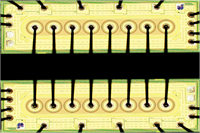MCM - Multiple-Chip-Module (Plastic) - Also known as MCP (Multiple-Chip-in-Plastic)
Bare die use in MCMs is very similar to SiP (System-In-Package), sometimes the two terms are used interchangeably. Both SiP & MCM are integration driven, however the level of complexity or functional aspiration of an MCM is usually not so high as SiP.
A typical MCM simplifies the system design by combining complimentary technology blocks together, this creates a standard which can then be used across multiple system designs. The modular functionality that results is usually technology genre specific.
For example:
Digital Processing - MCU + Volatile memory + Non Volatile Memory
Power Management - MOSFETs + Driver ICs / Controllers
Mechanically MCM assemblies are less likely to use die-to-die connections and bare die are assembled in either planar or stacked configurations.
Key benefits:
- Form factor
- Performance
- Power consumption
Form Factor
Bare die integration via MCM provides a possible solution when board space is constrained or smaller footprint provides a competitive product edge.
MCM Versus Single Package
MCM pros:
- Smaller X-Y profile than individually assembled components
- Development time relatively short, can enable a commercially unique product
- Electrical performances can improve based on increased component proximity
- Modular usage across multiple applications can assist investment payback.
MCM cons:
- Design + assembly & test development
- Requires viable access to each bare die at low volumes
- Design reliant on consistency of bare die supply
- May require specialist thermal modeling / management.
Single Package pros:
- Well qualified, reliable, fully warranted
- Ease of availability and at lowest cost
- Easier to re-design when required.
Single Package cons:
- Largest X-Y footprint
- Electrical performance limited by board layout
- Less opportunity for power efficiency
Plastic MCM Benefits in summary
Using bare die to create an MCM in plastic can produce an attractive commercial modular product with small footprint and performance benefits but without the higher complexity design & assembly needed to create a SiP. MCMs are well established in the industry in terms of design, assembly + test support. MCMs create a commercial and technical proposition where a SiP is neither electrically or commercially appropriate for the target market. As with SiP, MCMs are reliant on the availability of well qualified bare die both at low volume and production volumes.


